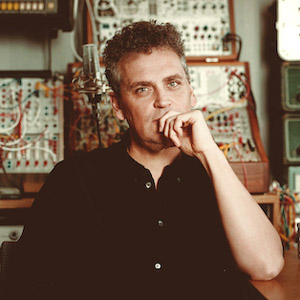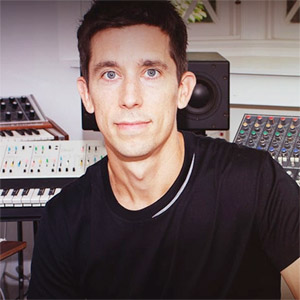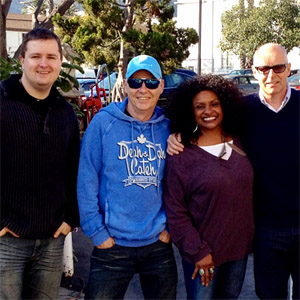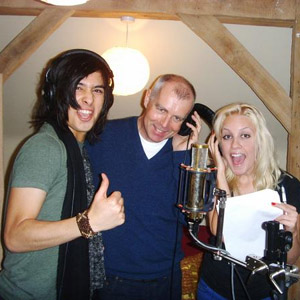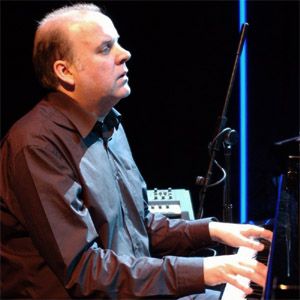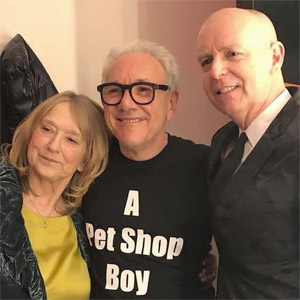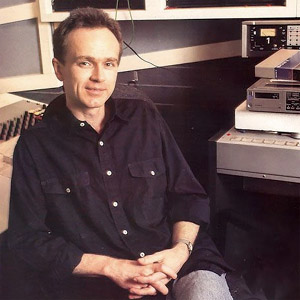Harold Faltermeyer is a German composer, producer and engineer. He is best recognized from his
analogue synthesizer soundtracks for movies Top Gun, Beverly Hills
cop, The running man,Kuffs, Tango & Cash and both parts of Fletch. He released his own album,
called Harold F. in 1988, then in summer 1990 in Munich he worked
with Pet Shop Boys on their album "Behaviour" (plus "Miserablism", which eventually became a B-side). He also played
keyboards on Billy Idol and Cher’s records, produced Glenn Frey’s and
Patti Labelle albums and remixed a couple of songs (including one from
Falco). Then he moved on into other projects, such as creating soundtracks
for computer games or producing dance music projects.
An article about Harold Faltermeyer was printed in "Literally" 4:
Harold Faltermeyer, producer of the Pet Shop Boys new
LP, is best known for Axel F, the theme tune to the film Beverly Hills cop which he composed,
produced and performed, but he is one of Germany’s most famous
producers. In the ’70s he became well known for his work with producer
Georgio Moroder. In recent years he has had divided most of his time
between records for the German market and a long stream of film
soundtracks.
“The Pet Shop Boys contacted me in March, I think. At
first I thought, ‘why, for heaven’s sake, are they taking in an outside
producer? Why aren’t they doing it themselves?’ So that made me curious.
They came over to Munich to meet me and I think they were shopping
around for someone who fitted their preliminary information for the
album—to do it with old, vintage synthesisers—and that’s absolutely up
my alley.
I was already a fan. When I first heard "West End
girls" I thought this was a very innovative thing. It’s not a
singer’s voice, but it has so much personality. My three favourites were
"West End girls", "Rent" and "Always on my mind". I’m not
a big album listener but of their’s the first one is my favourite.
When we met in Munich we went through their new demos.
The first one that struck me was "Being boring". I had my thumbs up
at that. "So hard" was only the basic groove—no melody—but I liked
the interchange of the ‘up’ orchestral parts and the tough electronic
groove.
We starting recording with "This must be the
place...". I had to get adjusted. It was different for me because
with films you have less time; here you had unlimited time to choose a
tambourine sound, for instance. You can tweak and twiddle and tweedle
with the songs forever. It was also different because usually I composed
a lot of the material and your fingers want to play something you would
have composed. Their songs are quite unusual, especially the timing of
the lyrics. It isn’t unmusical, but it’s very strange. It’s a
very strong signature.
Before I met them I had a feeling, because their stuff
is very intellectual, that I’d expect two intellectual guys, and I was
right. I think in some way the need each other very much. Neil is
probably the deep brain of the whole thing, then from the other side
comes a very fresh rhythmic guy, Chris Lowe. Neil is not very
rhythmical, whereas Chris has very good rhythmical ideas, and this
somehow describes their characters. Neil is the doctor of the group, the
scientist, whilst Chris is more the guts feeling musician.
I found they both like beer very much. I’m working in a
place outside Munich. It’s my house and I built a studio there two years
ago. I think in England you have five o’clock tea. We had our seven
o’clock beer in Munich. We went to my so-called ‘hut.’ It’s a replica of
a mountain hut in the grounds of my house, and we have real Munich beer
on tap in there. Chris was the one who said ‘hut time’ first. If we were
ten minutes late he would say, ‘so what about the hut now?’ Needless to
say, the work slowed down a little after that.
Disagreements? Well, I’m a very tough guy when it comes
to timing and the actual production quality. That makes a singer not
very happy. In these new songs they haven’t changed, they’ve just got a
little more thoughtful, a little more clever, and a little more
complicated, and the songs have higher melody ranges. Now we have nearly
finished, my favourites are, for the energy, "This must be the
place..." I like "Nervously" a lot—it’s a very innocent song in
a way; and "So hard". It made a big big jump for the first time I
heard it. And we giggled a lot when we first heard Neil sing the lyrics
...‘whose matches are
those?’ cracked us up a lot. It has a lot of spirit and it’s very
true.”
Interview for PSB Community forum:
Harold on first impressions
How did you become involved in the project? (dynamobjornen)
I got a call from Neil. My more-or-less first question was: “You guys are so talented, why do you need a third producer and a third opinion?”
He said: “Because we want to do it all with vintage synthesisers and we love the work that you did with Donna Summer and everyone else.”
One of his first questions was: “Do you still have all the old gear?”
And I said: “Yes, I do.”
Did you have preconceptions about Pet Shop Boys before you met them? (Paul J)
Of course. I was aware of their success, and of their success as producers, with Dusty Springfield and Liza Minnelli. It all added to me asking: “Why me?”
Please tell us about your first meeting, what was your first impression of them? (dynamobjornen)
We met in Munich - they both visited me in the studio. We listened to the first demos and it was excellent material. And so we started.
The creativity of Chris Lowe and somehow his innocence against music was very interesting to work with and to cope with. It is always a clash of interests in the first place between a trained musician and somebody who comes from a totally different place. I’m open for anything musically because that’s what makes music modern, and that’s what makes music innovative, so of course I listened to everything he suggested - and he was right! It was a clash of musicality against innovation. It was interesting and a great experience.
How did the songs emerge? Were there demos already done, which you were presented with? Or did you witness the actual writing of any songs? (Tom Angel)
They had the demos in place and the material actually was pretty good already. The demos sounded good - nothing to complain about… The lyrics somehow were two verses repeated because Neil said I’m going to rewrite that later, and he did. But the grid for our production was done, for when we started.
There is an urban legend among Pet Shop Boys’ fans about why the demos of Behaviour have never leaked, after 27 years. It seems that these demos are not available because they are still in your hands or in some place in your studio. Please, can you confirm that rumour? (astrocordoba)
I don’t know if I still have those. I couldn’t tell you.
Harold on recording Behaviour
What analogue synths were used? (Pod)
I mean, you name it, we got it. We obviously used anything which was on the market back then. It started with the Moogs, Kurzweil and Roland modular synthesisers; Oberheims, Yamaha - most stuff we found we used.
We used the TR-808 drum machines, the 909, the TB-303 - very iconic Roland vintage gear.
It was interesting because we needed one main machine to drive all those and back then I was working with the Synclavier. The Synclavier was in one way a great machine. On the other hand, especially in the pop market, to quantise things was rather tricky. You could quantise it down to a sixteenth note or an eighth note or whatever, but to quantise it down to a shuffle-beat was always a pain in the neck. So we had to work with this.
It was a master machine and it had some great stuff on the other hand - because we were able to use the 50k or 100k sampling facilities the Synclavier had back then, which is still unseen today. This was great - we had great sounds, we had brilliant, brilliant percussive sounds in the Synclavier which we could then incorporate in the production. So at the end it did a good job.
What was the split between analogue and digital instruments? (TallThinMan)
The only thing we used was we needed a master machine to control it so we had two parallel midi interfaces hooked up to the Synclavier, just to get all the gear up and running. It worked. It was a system which was very, very easy to be hooked up with digital machines and with recording equipment, so this was easy back then. Today it would be a lot easier with Pro Tools, but back then it was just a great way to work - you had everything online and you could change it easily.
Before that, when I started with Midnight Express with Giorgio Moroder and even with my own stuff, you couldn’t really hear everything at the same time because this was a generation before a multi-channel digital sequencer. But the Synclavier obviously worked, you know? They had eight or 16 midi outputs and of course then you had your 16 midi channels and you could run everything simultaneously without any problem with timing whatsoever. It was good.
Behaviour came out sounding very organic and warm, almost acoustic. How did this sound come about? (Danimal)
It’s of course using the early equipment, which is not just sampling units, and it’s not just a recording of the sound source which is repeatedly played by hitting a key. It adds so much warmth to a recording which is a thing I am still using on a daily basis, because it’s different.
On the other hand there’s a lot of punch - it’s a constant shift between oscillators and VCAs and VCFs. So that of course added a lot to the record.
Were the recording, mix and mastering analogue, or just the synths? (Ramzy)
We did some recordings on analogue tape as well just to have analogue generation on some key instruments.
How much was the album influenced by Depeche Mode’s Violator? (Pod)
We might listen to the groups that were around back then: “Did you hear what they did? Did you hear what Frankie Goes To Hollywood did? Did you hear that sound? Isn’t that great?” But we didn’t use it as an analytic piece of music where you took it into the studio and you took it apart. We never did that actually - you took it away and then you did your own thing. And the outcome of course was very similar sometimes but it was unique in a way because you added some different echoes, or whatever.
How was the workload in the studio divided? What roles, such as programming, were played by yourself, Neil and Chris? (Danimal)
This was an interesting set up. The guys came in in the morning - we started rather early in the morning, at 10 o’clock - which is not early for me because I’m an early bird - I’m up like five o’clock in the morning. So at five o’clock in the morning I started to just organise my sounds and store some stuff on the analogue synth and so on, and when they came in at 10 o’clock of course we had a coffee and we would sit discussing what we would do next.
Most of the time they had a plan when they came in and would say: “Ok, we have an idea - let’s work on this song.” So we put up the tapes - you know, it was not like today when you just hit a button and you can start - so you had to put up the tapes.
At that time we had a Harrison console - an analogue console - and it didn’t have memory features, so we had to find some kind of mix. And we got started with whatever we wanted to do.
We had an engineer with us, Brian Reeves, who did a brilliant job of the whole album as well, and so we started to find the mix of a tambourine sound or the next sequencer or we just started with a new song. And once we started with a new song we listened to the demo and while listening to the demo I would work up a piano chart which I needed to play later on.
Then I started to programme the drums, or at least I programmed a rhythm track and then I played the first instruments like bass or the keyboard and then very, very early on we started to record Neil’s voice. I always wanted to have the voice very early because then you can build an arrangement more easily because the vocal is obviously the most important thing on a record.
I remember doing guitar separates with Neil. We had a guitar in the studio and we did some samples with the guitar. This is all very, very funny work in progress. Of course we could have called in a guitar player but we didn’t; we just did it ourselves - it was just enough - we could hit it strong; we could hit it soft - there was a personality to it.
The same with using a vocoder - with whatever we use it’s always the law, that it’s not me doing the vocoder track - it’s Chris doing the vocoder track, right? These are the fine spices of a record which you have to obey and which you really keep in mind otherwise you get a record which starts to get more and more mediocre. You have to work at all the little spices and then you get an outstanding, very unique record.
Once we had the work done in the afternoon we’d have a break and then we went to the place where I’m sitting right now and have an afternoon beer - I’m having one now - and then we’d go back to the studio and work until eight o’clock or nine o’clock.
And then they would leave and go out to the city and go for dinner and I stayed here and I did my other work.
Did the boys enjoy the Munich nightlife? (Pod)
Oh yeah. I tried to show them around in a certain way because Bavaria is a beautiful area. Of course they enjoyed the sights of Munich and they enjoyed the culture of Munich. I recall them visiting the museums and a concert a bit later on.
Of course I tried to show them the countryside of Bavaria as well so once in a while we went out to one of the great lakes here and went out for dinner as well. We tried to spend some time.
How was working on Being boring? (Dog)
I think Being boring was one of the first tracks we started to record when we did Behaviour. It was one of my favourite songs actually when I heard the demos and it was the song where we had the most instant ideas for it, so it was fresh - that’s what I can recall after all these years - and we just dived into that.
We worked a lot on Being boring because it instantly hit off a lot of sound ideas of little sequences and little sounds of the Roland modular system which I had in mind which we could do. So that’s what we did.
It was an experience - because of course the whole experience with the Pet Shop Boys could have gone the wrong way as well - maybe we could not work together or the chemistry would not work. However it did work and this was our first “hurray” and a moment to say: “Yes, we can work together - and it is never boring!”
This must be the place I waited years to leave is perhaps the boys’ finest melancholy moment. Could you give a rundown, as far as your memory allows, as to the development of the production of that track from the first time you heard the demo through to the completed song with Marr and orchestra? (York Minster)
Especially the orchestra work which we did with [Angelo] Badalamenti. It was really outstanding. He is a great, great musician and a great composer. It was the dedicated wish of Chris and Neil to use him on the record. I recall we went to London and we recorded the London Symphony Orchestra at Abbey Road and it just added another great, great spice to the whole record.
I remember that I had some well weird arrangement ideas for strings for one of the songs [Harold arranged the orchestra for the track Nervously]. We recorded that with an orchestra and it gave another great spice to the tracks.
I recall great memories and great moments of creativity.
Harold on the finished album
Do you ever listen to Behaviour these days? (Dog)
I listen to it a lot and I have to tell you I’m pretty proud of what we did back then because it was a very interesting collaboration. There were two brains sitting in the studio and of course I did my share in a different way through music - they had their success as a group and they had their success as producers, as artists. So this is a sizzling combination as you might imagine.
It’s very interesting when the sparks are flying through a control room once you get on it and once you hear something and you pick it up and you have another idea for it and you start realising that this is a new idea. And then you start evaluating: “Is it a good idea? Is it a bad idea?” Some of them we decided were bad ideas so we dismissed those and continued with what we had already.
It was never boring. At the end of the day we mostly could say it was an interesting day. We didn’t have a lot of days when we said we didn’t do anything. We always went somewhere.
What is your favourite song on Behaviour, and why? (dynamobjornen)
I think Being boring is my all-time favourite because it’s such a smooth and intelligent song.
I like the sounds on So hard. I like the synthesiser work a lot. The driving stuff we had again with the Roland 700 series, the flanges which are very unique to the sound. You never get that on any other instrument. I like it lots.
And of course My October symphony was another of my favourites as well.
It’s all good memories and the great thing is that after all these years you still hear the critics stating that this is one of the great, great albums, which is great.
How did it happen that Miserablism was excluded from the final track list despite being considered as a potential single material? (drunk14)
I would have to listen back to it but it would trigger lots of memories. If I would play a song I can tell you 10 or 20 different stories about it!
Do you remember if there any additional tracks (i.e. Love and war) left from the session which remain unreleased? (drunk14)
Not really. The focus on the songs was done very, very early. I can’t recall if we had a lot of outtakes - there might have been one or two outtakes. But if you did ask me now I couldn’t tell you. I did so many productions and of course an outtake is there for a reason - because you take it out! You work on the stuff which makes it to the record.
Where do you see Behaviour fitting into your body of work as a musician? (Danimal)
It’s definitely in the top ten of my all-time favourites. It’s a very important project that I did. I still love the record and I’m only looking back with great memories when I did it with the two guys.
Harold on his career
How is working on a project like the Beverly Hills Cop soundtrack different than working with an act like Pet Shop Boys? (Danimal)
Working on a movie and working with the Pet Shop Boys is a totally different thing.
Doing a movie, you hardly have any time. You have to work extremely fast and you cannot really work in details. You cannot look for sounds. You have to get things done and get something down they can make a mix with.
Let’s face it - music in a movie is like third or fourth place in the whole picture. First of all you have the visuals. Then you have your dialogue. And then you have the sound effects. And then there’s the music. Because the sound effects are sometimes more important than the music. So you have to work around those.
So it doesn’t really matter which tambourine sound you choose because you can’t hear it anyway. You just need a tambourine. If you want to have a tambourine, get a tambourine. With the Pet Shop Boys it’s totally different. A tambourine is not a tambourine. We had, like, 300 samples on the Synclavier of tambourines. We listened to 300 tambourines because we had the time for it. But of course it leads to the philosophy of doing a unique record again, because if we use this tambourine of course it’s one that everybody uses… We used one that nobody used, and made it different.
There’s the difference - we had a lot more time to turn every stone and look what’s behind it, and that makes a unique record, and with a movie you can’t afford it.
After many years as a writer, producer and musician, Axel F was a huge hit, pushing you into the spotlight, alongside acts like Pet Shop Boys. Was this planned, or were you a reluctant pop star? (Paul J)
It was unintended, as you know… All of a sudden it was going to be a hit and you have to go front of stage. I’m a backstage guy, I’m not this front stage guy, I’m not a performer and I’m not a showman which you have to be to really perform in front of thousands or ten thousands of people. But of course I had the chance and I had to take it. And you cannot be 30% pregnant, there’s only 100% pregnant - so I had to do it, so I did it! It was a great experience.
The funny thing was, all of a sudden it was not a problem to get a first class flight or to get this accommodation which I always had to fight for for our musicians and for our producers when we did a record - budget, budget, budget - there was no budget for that! It was so funny.
Wouldn’t it be great to get that in the role backstage, but of course you can’t!
Harold on Pet Shop Boys
Do you continue to follow Pet Shop Boys and if so what do you think of their subsequent work? (Danimal)
Of course I am following what they are doing and it’s always great to hear what somebody else does with someone you’ve worked with in the past.
And it’s somehow a sad story that we’ve completely lost contact. Our last contact was years and years ago when they started to do their musical [Closer to Heaven opened in London in 2001] and I did a musical in Vienna which was successful about 15 years ago - so that was about the last time we talked together.
Projects are always a marriage of a certain time and then you move onto something different. That’s just the way it is.
Would you work with Pet Shop Boys again? I can but hope. (StevePSB)
Yes, certainly, certainly. 27 years ago it was great, and it could be great again, sure.
If you could create a new album with Pet Shop Boys and you could choose the musical style of it, which style would you choose? (nickname)
I don’t know. It would have to be a similar situation as we had 27 years ago - you listen to stuff and you make a plan. You have to have a plan whatever you are doing. What do you want to do? How should things sound? Should they sound electro? Should they sound modern, should they sound whatever, you know? And then I’m pretty sure we’d figure out what we would do.
Harold on life, and sausages
What are you working on at the moment? (Dog)
I still have my studio and I still work in music. But there are so many other things going on right now. I wrote two books recently - my autobiography two years ago, and last year I wrote a book which, believe it or not, is about Bavarian cooking!
Last year I launched a musical in Los Angeles which is the history of the famous Munich Oktoberfest, which we are continuing next year with a bigger set and a bigger stage.
So many things are going on - I’m trying to step away a little bit from music, but I will of course come back next year. There’s maybe going to be Top Gun 2 - I might be part of it, I don’t know yet. So there’s a lot of things.
I’m living a great life and I’m happy and content so everything is good.
Do you still make your own sausages? (daveid)
I sure do, yes [laughs].
Interview by Chris Payne, December 2017.
|
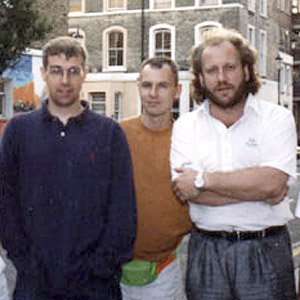
|
